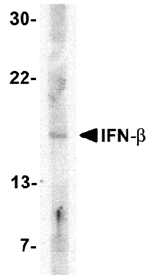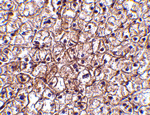Type I Interferons (IFN-alpha/beta) are produced primarily in response to viral infection by "Natural IFN-producing cells" (IPCs) as part of the host immune response and can also inhibit the development of tumors. IFN-beta binding by its receptor results in the activation of the tyrosine kinases Jak1 and Tyk2 and phosphorylation of members of the STAT family of transcription factors, leading to the transcription and expression of the immune response genes. More recently, several members of the toll-like receptor (TLR) family were found to stimulate the production IFN-beta. IFN-beta is currently used clinically for treatment of tumors, infections and multiple sclerosis.


